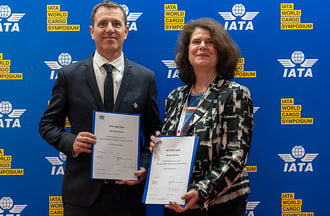
Translations: IATA y Smart Freight Centre unen fuerzas para el cálculo de emisiones de CO2 (pdf)
国际航协携手智慧货运中心合作计算货运碳排量 (pdf)
Hong Kong - The International Air Transport Association (IATA) and the Smart Freight Centre (SFC) announced a partnership to provide consistent and transparent CO2 emissions calculations for air cargo shipments. This is an important step for the global air transport sector to advance its decarbonization efforts.
The two organizations will focus efforts on developing the cargo component of IATA’s CO2 Connect offering, which successfully launched its passenger version in 2022. The IATA CO2 Connect platform uses primary industry data to power highly accurate carbon calculations. The collaboration with the SFC Clean Air Transport Program will promote a common methodology in CO2 emission calculations and ensure accurate and consistent CO2 calculations are distributed to the industry’s biggest shippers and freight forwarders in air cargo, supporting them with pre-shipment and reporting purposes.
“Our partnership with the Smart Freight Centre will help us to accelerate the development of CO2 Connect for air cargo as the most authoritative tool for carbon calculations. This is important for airlines, shippers and their customers who all need accurate calculations based on real data to support their contributions to global decarbonization efforts,” said Frederic Leger, IATA’s Senior Vice President for Commercial Products & Services, at IATA’s World Cargo Symposium (WCS) in Hong Kong.
"A key milestone has been reached and this has been a long time in the making. The need for unified emissions data is stronger than ever and this milestone will enable cargo transport service purchasers to make well-founded, long-term decisions. Transparency is key to drive decarbonization investments and activities, encouraging collaborative and synergetic action throughout the value chain. Our partnership with IATA will enable effective collaboration by building trust and exchanging information across the value chain which, in turn, will help in accelerating our ongoing efforts in decarbonizing the aviation industry," said Andrea Schoen, SFC Director of the Clean Air Transport program.
Pilot Project
IATA and SFC are working with Kuehne+Nagel as a pilot customer for IATA CO2 Connect for Cargo to ensure that the tool meets the needs and requirements of freight forwarders and their customers.
“As a freight forwarder, we can attest to the value that this collaboration will bring to the industry and to our customers.” said Fabiano Piccinno, Global Head of Sustainability Air Logistics at Kuehne+Nagel. “We’re happy to bring our expertise to the table and we look forward to seeing this project paving the way for future sustainable solutions in aviation.”
About SFC Clean Air Transport Program
The SFC Clean Air Transport program comprises over 50 members, including airlines, freight forwarders, shippers and fuel providers. It engages in collaborative actions to support aviation’s decarbonization efforts.
About CO2 Connect for Air Cargo
IATA CO2 Connect for Cargo is a CO2 emission calculator for air cargo shipments, using primary data from airlines. It will be available as of Q4 2024.
It considers airline specific fuel burn from both full freighter and passenger aircraft carrying belly cargo, airline specific cargo load factors, and passenger load factors to determine the correct ratio to attribute to belly cargo.
That CO2 data output provided will be aligned with the IATA Recommended Practice 1678, plus we will provide further outputs considering well-to-wake (WTW), CO2e and CO2/tonne-km to meet requirements from shippers reporting in those metrics.
For more information, please contact:
Corporate Communications
Tel: +41 22 770 2967
Email: corpcomms@iata.org
Notes for Editors:
- IATA (International Air Transport Association) represents some 350 airlines comprising over 80% of global air traffic.
- You can follow us on X for announcements, policy positions, and other useful industry information.
- Fly Net Zero
- IATA CO2 Connect for Cargo will utilize the Cargo CO2 Calculation Methodology (RP 1678) adopted by IATA’s Cargo Services Conference in 2014 and updated in 2022 to align with the Passenger CO2 Calculation Methodology (RP 1726). The document was developed by the IATA Air Cargo Carbon Footprint (ACCF) working group and endorsed by ICAO’s Committee on Aviation Environmental Protection (CAEP) in 2016.
- The RP1678 is the global standard to measure air cargo carbon footprint at the shipment level; it is also recognized as the reference methodology for air cargo by the Global Logistics Emissions Council (GLEC) in their framework for logistics emissions calculation methodologies.
The methodology includes factors such as:
- References to the Recommended Practice 1726 including the guidance on fuel measurement, aligned with the Carbon Offsetting and Reduction Scheme for International Aviation (CORSIA) and the weight-based calculation principle of allocation of CO2 emission between passenger and belly cargo
- Clearly defined scope to calculate CO2 emissions in relation to airlines’ flying activities
- Emissions factor for conversion of jet fuel consumption to CO2, fully aligned with CORSIA
- Guidance on carbon offsets and sustainable aviation fuel (SAF) as part of the CO2 calculation.
About SFC
Smart Freight Centre (SFC) is a globally active non-profit organization for climate action in the freight sector. Our goal is to mobilize the global logistics ecosystem, in particular our members and partners, in tracking and reducing its greenhouse gas emissions. We accelerate the reduction of logistics emissions to achieve a zero-emission global logistics sector by 2050 or earlier, consistent with 1.5° pathways.

